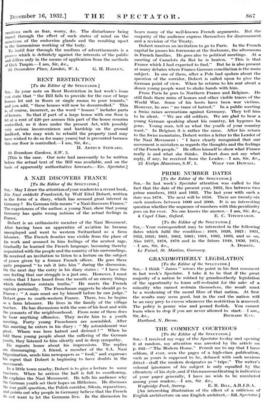A NAZI DISCOVERS FRANCE [To the Editor of the SPECTATOR.]
SIR,—May I draw the attention of your readers to a recent book, Ein Nazi entdeckt Frankreich, by Wolf Eitel Dobert, written in the form of a diary, which has aroused great interest in Germany? Its German title means " a Nazi discovers France." The experiences of the author, a young Nazi, show that young Germany has quite wrong notions of the actual feelings in France.
Dobert is an enthusiastic member of the Nazi Movement. After having been an apprentice of aviation he became unemployed and went to western Switzerland as a farm labourer. The French frontier was visible from the place of his work and aroused in him feelings of the acutest rage. Gradually he learned the French language, becoming thereby acquainted with the people and the country of his surroundings. He received an invitation to listen to a lecture on the subject of peace given by a former French officer. He goes there quite prepared " to rub it into him " during the discussion. On the next day the entry in his diary states : " I have the sure feeling that our struggle is a just one. However, I must confess that I have heard from the mouth of an enemy things which doubtless contain truths." He meets the French captain personally. The Frenchman suggests he should go to France : " A man must see by himself before he can judge." Dobert goes to south-western France. There, too, he begins as a farm labourer. He lives in the family of the village teacher. He has discussions with the sons of his host and with the peasants of the neighbourhood. From none of them does he hear anything offensive. They invite him to a youth meeting. Forty young Frenchmen are assembled. After this meeting he enters in his diary : " My astonishment was great. Where was here hatred and distrust ? " When he told these young people about the suffering of the German youth, they listened to him silently and in deep sympathy. He reports home about his impressions. The replies are discouraging. A friend, a member of the S.A. Nazi Organization, sends him newspapers as " food," and expresses his regret that Dobert is beginning to have doubts in the movement.
In a little town nearby, Dobert is to give a lecture to some teachers. When he arrives the hall is full to overflowing. He explains the Nazi Movement. He tells his audience why the German youth set their hopes on Hitlerism. He discusses the war guilt question, the Polish corridor, Silesia, reparations, and points out why people in Germany believe that the French do not want to let the Germans live. In the discussion he hears many of the well-known French arguments. But the majority of the audience express themselves for disarmament and a revision of the Treaty.
Dobert receives an invitation to go to Paris. In the French capital he passes his forenoons at the Sorbonne, the afternoons in French families. He goes also to political meetings. At a meeting of Camelots du Roi he is beaten. " This is that France which I had expected to find." But he is also present at many debates where Franco-German conciliation is the main subject. In one of them, after a Pole had spoken about the question of the corridor, Dobert is called upon to give the .German point of view. When he returns to his seat about a dozen young people want to shake hands with him.
From Paris he goes to Northern France and Belgium. He still finds there ruins of houses and other visible traces of the World War. Some of his hosts have been war victims. However, he sees " no trace of hatred." In a public meeting a Swiss raises accusations against Germany. They tell him to be silent. " We are old soldiers. We are glad to hear a young German speaking about his country, let bygones be gone. Young man, tell us what the youth of your country want." In Belgium it is rather the same. After his return to the Swiss mountains, Dobert writes a letter to the Leader of the Nazi Movement : " I have clearly recognized that our movement is mistaken as regards the thoughts and the feelings of the French people." He offers himself to show what France really is and what she thinks. Dobert does not say what reply, if any, he received from the Leader.—I am, Sir, &c.,






























 Previous page
Previous page